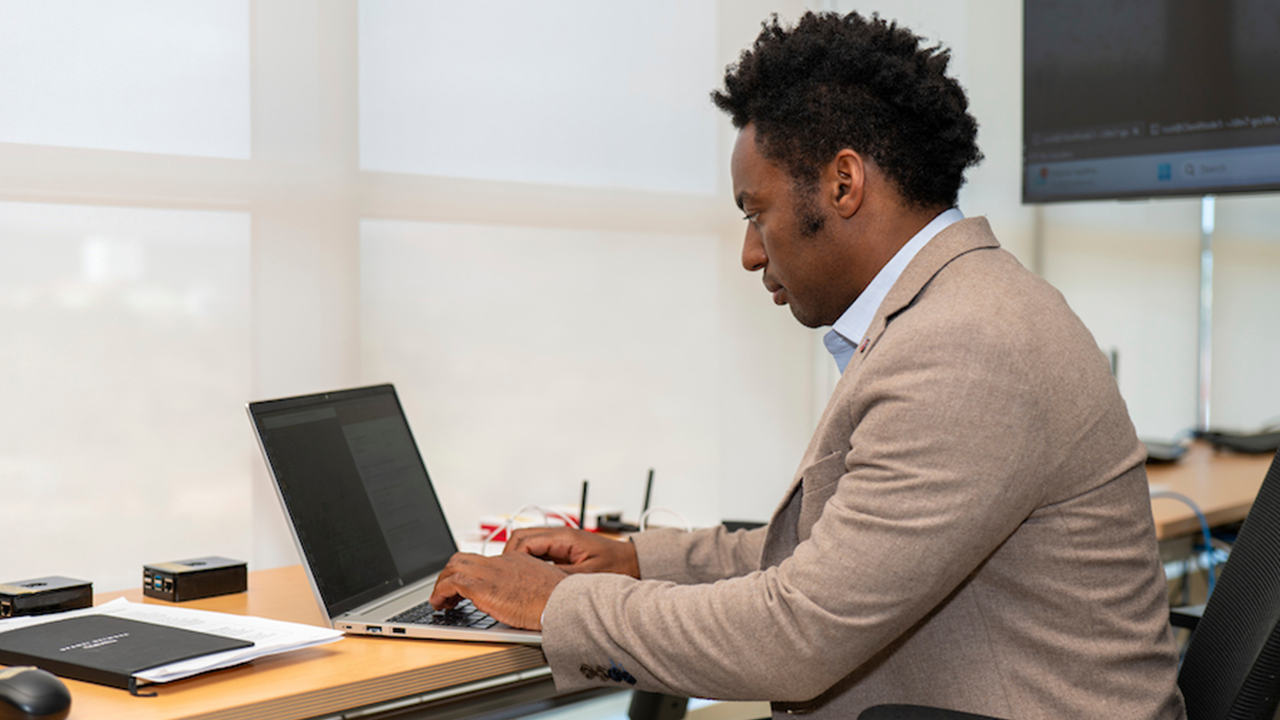Improving digital infrastructures for all
Theophilus Benson tackles SDG 9
Emily Liu
Nov 1, 2024
During a previous work experience, Theophilus Benson, a professor in the Department of Electrical and Computer Engineering (ECE), realized something about the way webpage optimizations are handled. For larger companies, it's easy to invest as many resources as necessary to fix performance issues as they surface — but startups and local network service providers aren’t always able to do the same.
With that in mind, Benson began investigating ways to improve the performance and accessibility of digital infrastructures. He works to realize Sustainable Development Goal 9 (SDG 9), one of 17 SDGs adopted by the United Nations in 2015 to improve the well-being of all people and the whole of the planet. SDG 9 calls for measures to build resilient infrastructure, promote inclusive and sustainable industrialization, and foster innovation.

Benson takes three primary research strategies towards that goal: identifying barriers to efficient network service within the realm of resource constraint, quantifying fundamental technological differences between the Global North and Global South, and creating dynamic frameworks that can adapt to those differences.
"That's the central theme of it," Benson says. "Basically, how can we make it so you can always access content, and you can always access it quickly?"
Benson is based at Carnegie Mellon University Africa, where he spearheads the research project known as Democratizing Mobile Web Performance. He investigates sources of inefficiency in webpage optimization and identifies ways to provide content through low-resource networks to low-resource mobile devices, a crucial step in keeping developing regions connected with developed regions. He’s also working with Internet Society (ISOC) as well as local internet exchange points (IXPs) to improve connectivity between various mobile providers and various content providers.
In recent years, Benson worked on the development of KubeKlone, a digital twin that models cloud-native microservices applications such as Google or Amazon. Training AI for IT operations requires large amounts of data, and experimenting through model deployment costs considerable time and money. KubeKlone decouples the simulation of microservices from the training of machine learning models, and certain sections of complex code are abstracted for simplicity. This allows KubeKlone to operate quickly, adapt as needed, and remain user-friendly.
Benson also worked on the creation of Nimble, which performs network function (NF) migration and routing policy updates simultaneously by alternating between the two. Previous solutions complete NF migration in its entirety first, but this can cause data packets to become lost during the subsequent routing policy updates, leaving certain NFs vulnerable to cyberattacks. Nimble ensures that all data packets get processed correctly while simultaneously reducing the total time needed to complete both NF migration and routing policy updates.
Upon analyzing the memory usage of 1000 frequently-visited websites, Benson's team found that the indirect consequences of JavaScript functions contributed significant memory overhead, causing high-demand sites to lag when accessed through the modest hardware of mobile phones. His findings highlight the need to shed light on the memory component of the mobile web, which will guide efforts to improve quality of service for mobile phones.
Benson and his research team have a lot on the horizon. He will soon be submitting a series of position papers that define his team's broader research agenda. This summer, he attended the African Peering and Interconnection Forum (AfPIF) in Kinshasa, Democratic Republic of the Congo (DRC) and gave a talk on understanding/analyzing the subsea cable cuts in Africa. He also participated in the African Internet Summit held in Mauritius. This November, he and his research associate Semebia Wurah will be participating in the ACM Internet Measurement Conference in Madrid, Spain. He will also host a remote event for the conference at CMU-Africa.